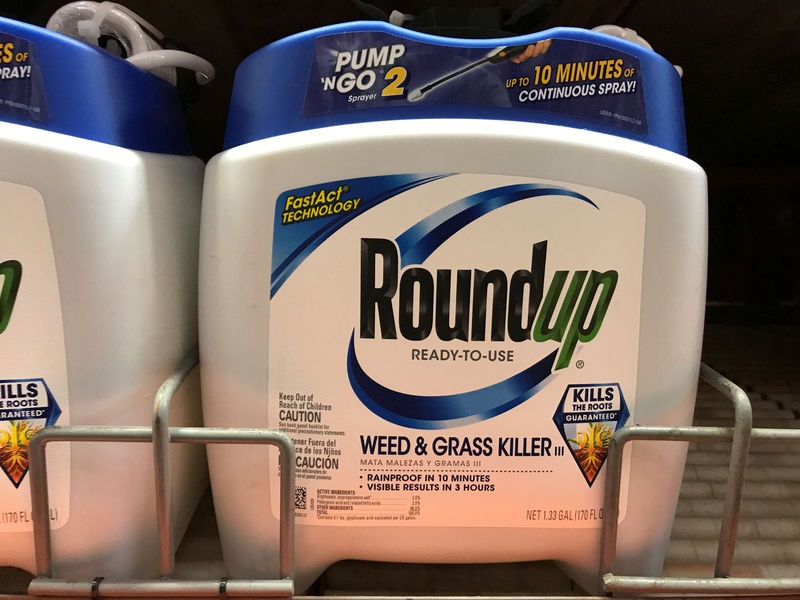By Tina Bellon
NEW YORK (Reuters) - Bayer AG (DE:BAYGN) plans to argue that a $2 billion (£1.56 billion) jury award and thousands of U.S. lawsuits claiming its glyphosate-based weed killer Roundup causes cancer should be tossed because a U.S. regulatory agency said the herbicide is not a public health risk.
Some legal experts believe Bayer will have a tough time convincing appellate courts to throw out verdicts and lawsuits on those grounds. Bayer has a better shot if a business-friendly U.S. Supreme Court takes up the case, experts said. But that could take years.
Bayer has come under intensifying pressure after a third consecutive U.S. jury on Monday found Roundup to be carcinogenic, awarding more than $2 billion to a couple who used the chemical on their property - the largest verdict in the glyphosate litigation to date.
Bayer, which inherited the Roundup litigation with its $63 billion (£49.23 billion) acquisition of Monsanto (NYSE:MON) last year, faces lawsuits by more than 13,400 plaintiffs nationwide, alleging the product causes cancer.
The Germany-based company's shares have been hammered since the first Roundup cancer verdict against it last August, wiping out some 40 billion euros (£34.93 billion) in market value and leaving Bayer worth less than the price it paid for Monsanto.
Bayer denies that Roundup causes cancer, saying decades of studies have shown glyphosate and the weed killer to be safe.
On Wednesday, the company said it will argue that the lawsuits, which are brought under state law, conflict with guidance from a federal agency, the U.S. Environmental Protection Agency.
On April 30, the EPA reaffirmed prior guidance saying that glyphosate is not a carcinogen and not a risk to public health when used in accordance with its current label..
Citing the EPA decision, Bayer has repeatedly rebuked plaintiffs' calls to add a cancer warning to Roundup, saying the agency would reject that change.
Under the legal doctrine of preemption, state law claims are barred if they conflict with federal law.
"We have very strong arguments that the claims here are preempted ... and the recent EPA registration decision is an important aspect of that defence," William Hoffman, one of Bayer's lawyers, said during a call with reporters on Wednesday. Hoffman said the argument applied to all U.S. Roundup lawsuits.
Preemption is generally regarded as a "silver bullet defence" because it stops claims across the board, said Adam Zimmerman, a law professor at Loyola Law School in Los Angeles.
But Zimmerman and three other legal experts agreed that Bayer faces a big hurdle convincing appeals courts that the EPA determination on glyphosate shields it from state law claims.
They cited a 2005 U.S. Supreme Court ruling that the EPA's approval of a product does not necessarily bar state law claims. The ruling, Bates v Dow Agrosciences, gives broad leeway to juries to decide if such claims should proceed, they said.
Judges in the three Roundup cases that have gone to trial against Monsanto all rejected the company's preemption argument, citing this ruling.
"In light of the Bates decision, it's going to be an uphill battle for the company to win on preemption on appeal," Zimmerman said.
Bayer also said it will argue on appeal that trial courts improperly admitted evidence that was not backed up by science. But legal experts said appellate courts generally defer to lower court evidentiary rulings.
'SORE THUMB'
Lars Noah, a law professor at the University of Florida, said Bayer's chances of success would increase significantly if the Supreme Court takes up the Roundup appeals.
The high court only accepts around 70 cases each year, but a business-friendly majority on the court could be inclined to hear the dispute, said Alexandra Lahav, a law professor at the University of Connecticut.
Since 2005, the high court has decided at least three preemption cases in favour of companies, none of which involved the EPA.
The Supreme Court will soon rule in another case that rests on whether a U.S. Food and Drug Administration approval preempts tort claims.
In that case, plaintiffs sued Merck & Co over the company's alleged failure to warn of the risk of serious bone fractures associated with its osteoporosis drug Fosamax.
Merck, which denies the allegations, argued the lawsuits should be preempted because the FDA did not require an additional fracture warning in the drug's prescribing information. During a January hearing, the Justices appeared to side with the company.
Bayer in a statement on Thursday said it does not believe the 2005 Bates ruling posed a barrier for the appellate courts due to other Supreme Court rulings since then.
Noah agreed that the Court has more recently signalled its appetite to limit lawsuits that contradict opinions by experts at regulatory agencies.

"The Bates decision by now sticks out like a sore thumb," Noah said. "Bayer has more than enough ammunition in recent Supreme Court cases to show the trial court judges got it wrong."